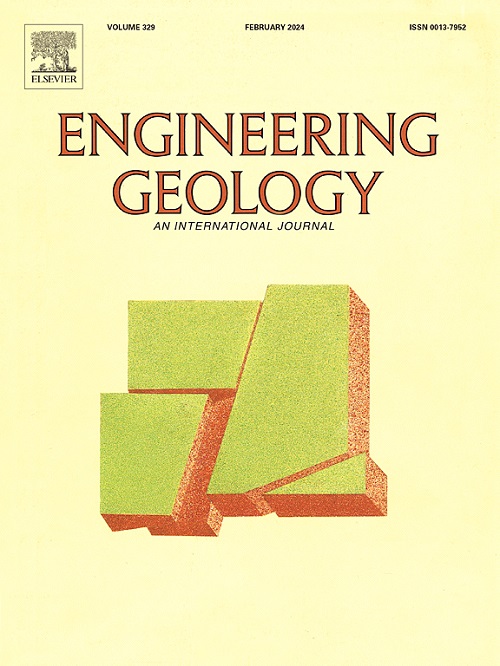Insight into failure mechanisms of rainfall induced mudstone landslide controlled by structural planes: From laboratory experiments
IF 8.4
1区 工程技术
Q1 ENGINEERING, GEOLOGICAL
引用次数: 0
Abstract
The role of structural planes in controlling mudstone landslides is a key issue in the study of geo-disasters in the Loess Plateau of China. In this study, the effects of sliding-control structures on the mechanisms of mudstone landslides are investigated via three model experiments with different slope structures. The results show that the hydrological response and failure mode of the experimental slope vary with the structural conditions. The vertical joints serve as preferential seepage paths, which accelerate rainfall infiltration, resulting in earlier responses of volumetric water content and pore water pressure. With the incorporation of vertical joints, the slope failure mode tends to transform from shallow failure to deep-seated failure. The presence of a weak interlayer leads to significant increases in the velocity and runout of the sliding mass. The variation in the slope failure extent and deformation characteristics with varying sliding-control structures further changes the temporal and spatial distributions of volumetric water content and pore water pressure. The different slope failure modes correspond to different sliding-control mechanisms, which are dominated by the types of structural planes and their interactions with hydrological responses. In the action of these mechanisms, pore water pressure and seepage force play significant roles in the reduction of effective stress and shear strength.
洞察受结构平面控制的降雨诱发泥岩滑坡的破坏机制:来自实验室实验
结构平面在控制泥岩滑坡中的作用是中国黄土高原地质灾害研究中的一个关键问题。本研究通过三个不同边坡结构的模型试验,研究了滑动控制结构对泥岩滑坡机理的影响。结果表明,实验边坡的水文响应和破坏模式随结构条件的变化而变化。垂直节理是优先渗流通道,可加速降雨渗透,从而使体积含水量和孔隙水压力的响应提前。加入垂直节理后,边坡的破坏模式往往会从浅层破坏转变为深层破坏。软弱夹层的存在会导致滑动体的速度和跳动显著增加。随着滑动控制结构的变化,边坡破坏范围和变形特征的变化进一步改变了体积含水量和孔隙水压力的时空分布。不同的斜坡破坏模式对应不同的滑动控制机制,这些机制主要由结构平面的类型及其与水文反应的相互作用决定。在这些机制的作用下,孔隙水压力和渗流力在降低有效应力和抗剪强度方面发挥了重要作用。
本文章由计算机程序翻译,如有差异,请以英文原文为准。
求助全文
约1分钟内获得全文
求助全文
来源期刊

Engineering Geology
地学-地球科学综合
CiteScore
13.70
自引率
12.20%
发文量
327
审稿时长
5.6 months
期刊介绍:
Engineering Geology, an international interdisciplinary journal, serves as a bridge between earth sciences and engineering, focusing on geological and geotechnical engineering. It welcomes studies with relevance to engineering, environmental concerns, and safety, catering to engineering geologists with backgrounds in geology or civil/mining engineering. Topics include applied geomorphology, structural geology, geophysics, geochemistry, environmental geology, hydrogeology, land use planning, natural hazards, remote sensing, soil and rock mechanics, and applied geotechnical engineering. The journal provides a platform for research at the intersection of geology and engineering disciplines.
 求助内容:
求助内容: 应助结果提醒方式:
应助结果提醒方式:


